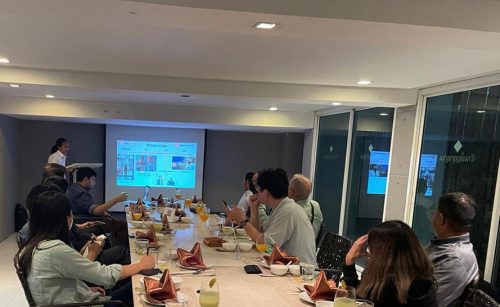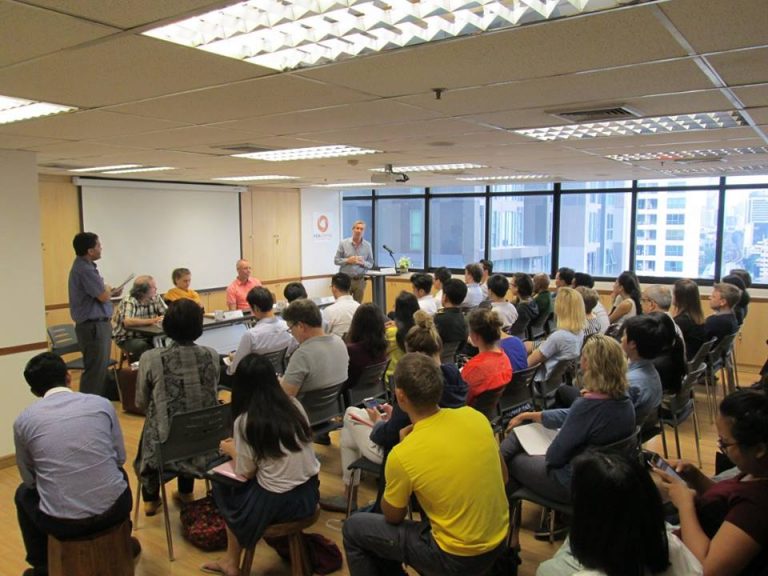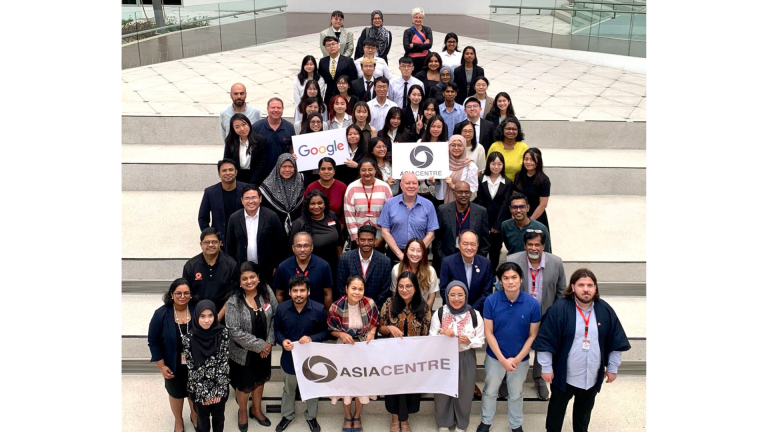
Spanning a day and a half, the End-of-Programme Meeting for the “Digital Rights Programme for Civil Society Organisations” was held from 25 to 26 October 2024 in Johor Bahru, Malaysia. It marked the culmination of a year-long initiative focused on enhancing the understanding and advocacy of digital rights among Civil Society Organisations (CSO)s.
The meeting brought together over 60 participants and included CSO representatives from European Values Center for Security Policy, Japan NGO Center for International Cooperation (JANIC), Council of Asian Liberals and Democrats (CALD), Hashtag Generation, Digital Rights Nepal, Southeast Asia Freedom of Expression Network(SAFEnet), Cambodian Centre for Independent Media (CCIM), ENGAGE Malaysia, Karyasama, The Independent Singapore and academics working online regulation issues from University of Reading Malaysia, Universiti Malaysia Sarawak, Universiti Utara Malaysia, University of Dhaka, Tunku Abdul Rahman University of Management and Technology and students from the School of Law, University of Reading Malaysia.

Day 1 was held at the School of Law, University of Reading Malaysia (UoRM) and featured an MoU signing ceremony with CSO partners, three-panel discussions and one workshop on digital security in the Asia Pacific.
Dr James Gomez, Regional Director of Asia Centre opened the event by highlighting Asia Centre’s partnership with Google through the years. He noted the partnership has helped improve the digital literacy of users in the region, with outputs such as the publication of the report on youth and disinformation in Malaysia in 2022 to the delivery of the ASEAN Digital Literacy Programme Training of Trainers in 2022 to 2023 in Malaysia and Thailand, and the current Digital Rights Programme for CSOs in 2024, as well as the ongoing Digital Security Training which is currently being delivered right through to February 2025.
Dr. Gomez’s remarks were followed by a short speech from Associate Professor Anne Vergis, Head of Law, UoRM. Prof Vergis emphasised the importance of convening such gatherings in bringing together participants from various backgrounds and expertise to learn from one another and gather insights on how grassroots advocacy is impacted by laws to regulate developments in digital technology.
The opening session was followed by a Memorandum of Understanding (MoU) signing ceremony between Asia Centre and four CSO partners; Digital Rights Nepal, Hashtag Generation, Southeast Asia Freedom of Expression Network (SAFEnet) and European Values Center for Security Policy. The MoUs are part of eight MoUs the Centre has signed with key partners throughout the Google supported programme to strengthen CSO partnership to advance digital rights in the region.
The first session, titled “A Year in Review: The Digital Landscape in 2024”, examined how various Asian governments have used new and existing laws to regulate criticism of public policies. In Singapore, the use of POFMA was noted as a tool to restrict dissent, while Sri Lanka has faced public outcry over its internet shutdowns and restrictive digital laws. Cambodia’s low digital literacy and increasing notoriety for online scams complicate citizens’ awareness of government censorship, which targets grassroots activists and journalists. Japan’s new cyber laws aim to curb cybercrime and improve the effective handling of cyber threats but raise concerns about potential misuse against critics, and Taiwan uniquely contends with Chinese interference through disinformation and cyberattacks. Across these countries, the panellists noted that digital advancements have opened public discourse, however governments have acted to control and monitor online spaces.

The second session “The Key Developments in Online Regulation in the Region” was an opportunity for panellists to recount how civil society organisations (CSOs) in Asia, with limited digital literacy, data vulnerabilities, and technical ability are being subjected to state manipulation. It was noted that governments across the region are increasingly enacting restrictive digital laws, leveraging social media to shape public opinion, and employing harassment tactics against critics. Despite these pressures, grassroots activists have effectively used online platforms to amplify their voices, while some platforms resist demands to compromise user privacy. Panellists’ recommendations focused on enhancing CSOs’ digital literacy and cybersecurity, promoting balanced regulations that protect both security and freedom of expression, and encouraging platforms to uphold user privacy amidst regulatory pressures.

The third session of Day 1 was used to deliver a Digital Security Training, starting with an overview of digital threats facing CSOs in the Asia Pacific region. This was followed by an interactive discussion on identifying various ways of protecting individuals and organisations through different tools and digital hygiene practices. Participants shared personal and organisational experiences as victims of scams and phishing, and they expressed concerns about how to enhance digital resilience among the general public as technology evolves rapidly.

The last session of Day 1 was a panel on Malaysia on the theme “Holding Tech Companies Accountable”. The panellists emphasised that while tech companies should be accountable for the digital harm on their platforms, responsibility must be shared among users, creators, legislators, and enforcers to maintain a balanced digital ecosystem and avoid over-regulation that could restrict free expression. There was a strong consensus in the room on the need for comprehensive digital literacy and education, especially for young users, as blanket bans on underage access are ineffective. Finally, the panel highlighted challenges in regulating international actors who spread disinformation and navigating vague state laws that grant broad investigative powers, often restricting dissent and enforcing compliance in digital spaces.

Day 2 was convened at the Asia Centre Media Hub with two sessions reflecting on the outcomes of the year-long initiative. Session 1, “Revisiting the Project’s Impact”, reflected on the programme’s efforts to establish a regional network and enable resource creation, joint UN report submissions and capacity building. Participants agreed that the network established by the programme now forms a solid foundation of trust to engage in joint advocacy efforts and encourages CSOs from this network to undertake joint future activities.
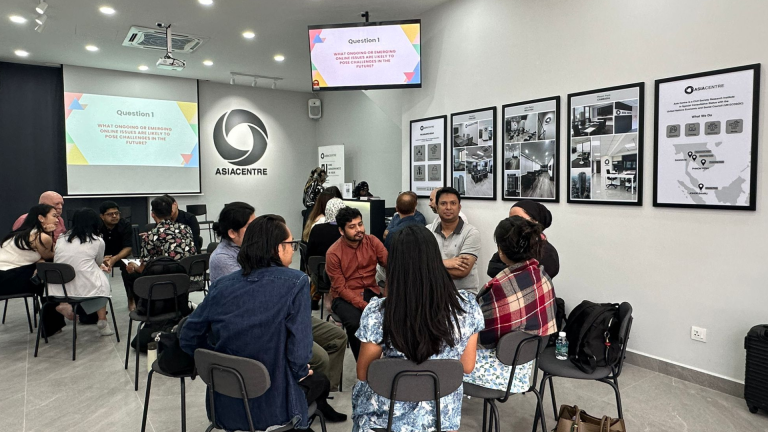
In the final session, “What’s Next?”, participants reflected on the future challenges and directions for digital rights advocacy. Four major issues were identified: misinformation; AI deepfakes; excessive regulation in digital spaces; and foreign interference through coordinated inauthentic behaviour, as critical challenges to address in the digital rights landscape. To address these concerns, participants emphasised the importance of fostering digital literacy starting at home and in schools, with shared responsibility among parents, the education ministry, and the government. They noted that awareness efforts must also keep pace with rapid technological changes, suggesting user training and empowering civil society as crucial next steps. Regarding resources, networks, and strategy, participants highlighted the need for CSOs to have adequate financial, information, and human resources, as well as highlighting that ethical commitment from those in power is also vital to combat digital threats. Looking to the future, participants expressed optimism about continuing advocacy efforts while acknowledging that impact may take time.
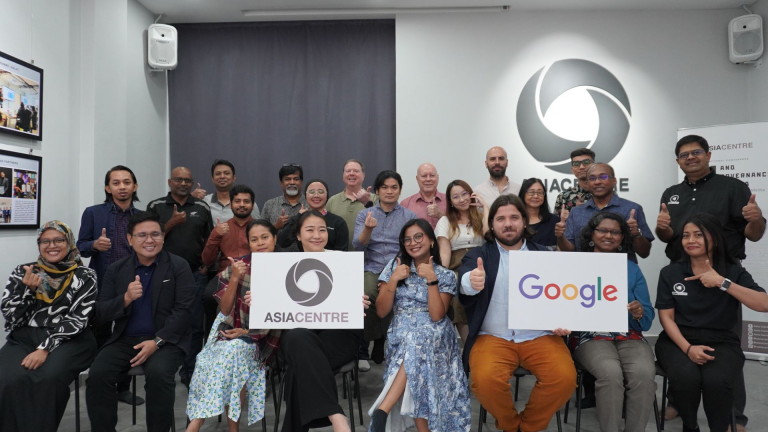
The end-of-programme meeting concludes the one-year Digital Rights Programme for Civil Society Organisations, which was co-convened by Asia Centre with Google Asia-Pacific that commenced in December 2023. The year-long Digital Rights Programme brought together CSO and INGO partners around the region in both online and on-site activities to address pertinent digital issues affecting the civic space. Throughout the year, we conducted five online sessions and four on-site sessions that addressed a wide range of issues affecting CSOs and their ability to effectively advocate in the digital world. These sessions engaged over 100 CSOs in the Asia Pacific region. These discussions explored the challenges and opportunities that arise when leveraging digital platforms for advocacy, such as navigating censorship, disinformation, and privacy and security concerns, as well as understanding the impact of social media algorithms on outreach efforts. Additionally, the sessions examined the need for improved digital literacy among civic leaders, strategies for engaging diverse online communities, and the role of technology and tech companies in both empowering and limiting grassroots movements.
Review the key activities of the year-long initiative through the links below:
- December 2023: Digital Rights Programme for Civil Society Organisations Kicks Off
- January 2024: Asia Centre Launches Report on Online Content Regulations in the Asia-Pacific
- February 2024: Asia Centre Hosts Regional Meeting on Digital Rights
- March 2024: Fact-Checking Useful, But No Longer Primary Tool Against Disinformation
- April 2024: Disinformation Biggest Threat to Taiwan’s Democracy: CSOs Say Shift in Narrative Needed
- May 2024: CSOs Need to Strengthen Media Literacy for Underrepresented Groups
- June 2024: CSO Voices in Cambodia Needed in AI Discussions
- July 2024: CSOs Need to Guard Against Surveillance and Privacy Threats
Watch the Youtube Short video highlights of the meeting here.
Photos of the meeting are now available on the Centre’s Facebook page (Day 1 & Day 2)
Asia Centre is a civil society research institute in Special Consultative Status with the United Nations Economic and Social Council. It serves as a knowledge partner and undertakes evidence-based research as well as provides capacity-building training for end beneficiaries. If you would like to collaborate with the Centre, please send an expression of interest to contact@asiacentre.org.
Follow Asia Centre’s social media channels for more information.



